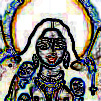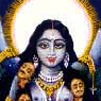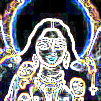




It's a millenial thing. Anyone who's been paying attention to the signals knows that Western pop culture has taken a turn toward the darker side in the last ten years, as much, perhaps, as the cultural shift that made the events of the 60s possible. Sure, there were subcultures that dealt with the negative before -- the more nihilstic punk rock scene, the materialisim of the eighties yuppie scene -- but in the last ten years, film, literature, design, music, and the slightly more obscure signals of shopping patterns, color pallettes, and advertising, have all pointed to something more significant. Vampires have become so popular that "vampire romance" is a viable genre for the hack writer, television series like the "X-Files" and "Millenium" are tremendously popular, while their "lighthearted" counterparts are now "Buffy the Vampire Slayer," and "Sabrina the Teenage Witch" as much as "Friends" or "Baywatch." We are wearing darker colors, and not just at Vassar. Halloween has nearly surpassed Christmas as the most popular holiday in America. "Goth" is cool. There is definitely something going on.
The religious (by which I mean fundamentalist Christian) right wing judges the current phenomenon to be a sign of the end times, a total cultural and societal corruption. For once, they arenžt that far off. While the shift wežre seeing now isn't neccessarily the sign of "corruption," it is the sign of an approaching end -- whether that end is merely of the century, or of the world as we know it is up for argument, but I tend to support the former. Just as the symbolist poets and dramatists and designers of the 1890s embraced and celebrated the darker areas of human existence, we have become obsessed with those things left to lie on the edges of society for the rest of the century.
Kali is the logical deity for these angst-ridden times. Her presence turns our cultural fixation on "the dark" into a reclamation of those things which are be a part of our lives and aesthetics, but which we tend to ignore: death, violence, decay. Kali makes even these problematic concepts a part of Her whole, and while she is scary, she is also the mother, and her trappings cannot be feared the way they could if we never saw them and they crept on us unaware. She gives us a way to deal with te darkers parts of ourselves and our culture. She gives us comfort in the same breath with knowledge of our own mortality. She is the opposite of the repressed, selectivly moralistic, puritannical tendencies of our culture, and she is perhaps just what we need to get us through the events of the years surrounding the millenium that we fear the most.





